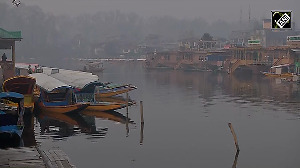New classified intelligence obtained before the May 29 disappearance of the journalist, Saleem Shahzad, 40, from Islamabad, and after the discovery of his mortally wounded body, showed that senior officials of the spy agency, the directorate for the ISI, directed the attack on him in an effort to silence criticism, New York Times reported quoting two senior Obama administration officials.
The intelligence, administration officials said they believed was reliable and conclusive, showed that the actions of the ISI, as it is known, were "barbaric and unacceptable".
But the disclosure of the information could further aggravate the badly fractured relationship between the US and Pakistan, which worsened significantly with the American commando raid two months ago that killed Osama bin Laden in a Pakistan safe house.
The newspaper said Obama administration officials will deliberate in the coming days how to present the information about Shahzad to the Pakistani government, an official said.
The disclosure of the intelligence was made in answer to questions about the possibility of its existence, and was reluctantly confirmed by the two officials. "There is a lot of high-level concern about the murder; no one is too busy not to look at this," said one.
A third senior American official said there was enough other intelligence and indicators immediately after Shahzad's death for the Americans to conclude that the ISI had ordered him killed.
"Every indication is that this was a deliberate, targeted killing that was most likely meant to send shock waves through Pakistan's journalist community and civil society," said the official.
A spokesman for the Pakistan intelligence agency said in Islamabad on Monday that, "I am not commenting on this."
George Little, a spokesman for the Central Intelligence Agency, declined to comment.
Pakistan said the fresh allegations by US officials that ISI ordered the killing of Shahzad were part of an "international conspiracy" to malign the country's security forces.
"There is an international conspiracy to malign the law enforcement agencies and security forces. These allegations are part of that conspiracy," Information Minister Firdous Ashiq Awan told reporters on the sidelines of a SAARC seminar in Islamabad . However, he did not give any details of the "international conspiracy" that she referred to.
Ia statement the day after Shahzad's waterlogged body was retrieved from a canal 60 miles from Islamabad, the ISI publicly denied accusations in the Pakistani news media that it had been responsible, calling them "totally unfounded."
The ISI said the journalist's death was "unfortunate and tragic," and should not be "used to target and malign the country's security agency."
The killing of Shahzad, a contributor to the website Asia Times Online, aroused an immediate furor in the freewheeling news media in Pakistan. Shahzad was the 37th journalist killed in Pakistan since the 9/11 attacks, according to the Committee to Protect Journalists.









